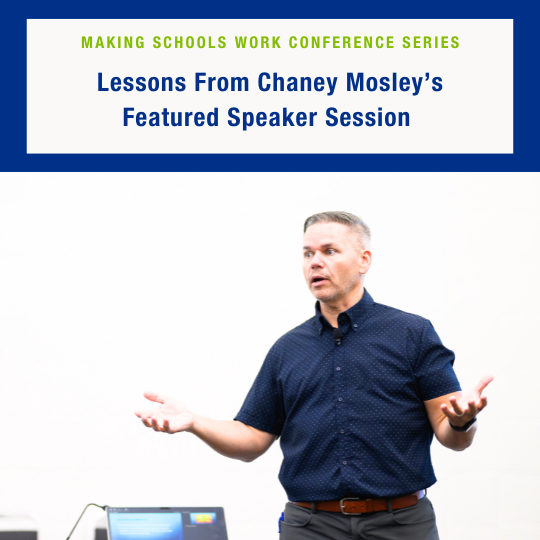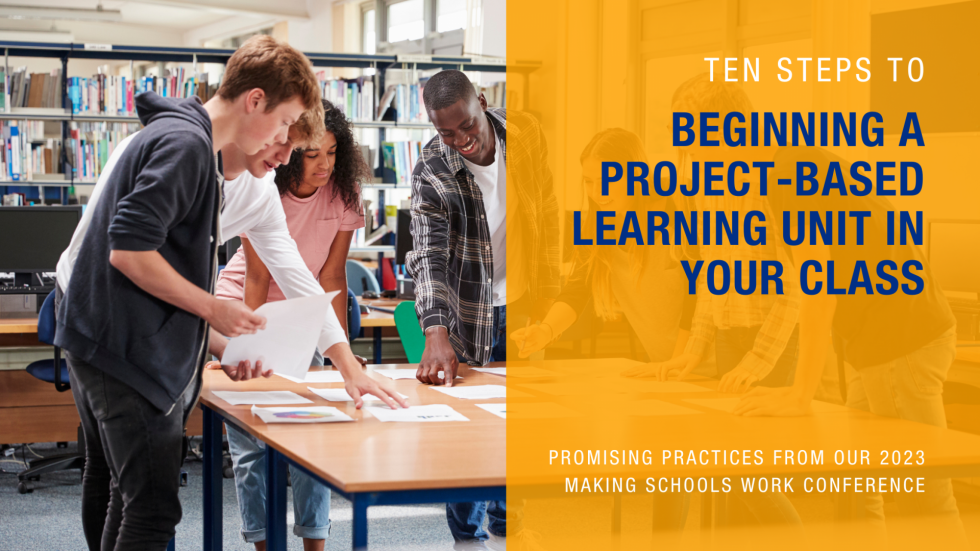Blog Main
Building a True Culture of Love in Your School
In the latest episode of our Making Schools Work podcast, we sit down to talk with Dr. Marck Abraham, CEO of MEA Consultant Services, to hear his advice on creating a culture of accountability in your school. If you want to learn some of his tips but don’t have time to listen to the full episode, this post is for you.
The Resilient Walker: 6 Ways to Shift Your Perspective and See the Whole Student
The 2025 Making Schools Work Conference was held in New Orleans from July 15-18. In our conference posts, we offer insights and lessons learned from many of the sessions we attended at the conference. In this post, we talk about Shree Walker’s advice on seeing the best in all of your students.
Investing Early in Teachers Pays Dividends for Everyone
In this post, we look at why investing early in teachers leads to great results for everyone involved. Through data and research, see how investing in teachers leads to things like higher retention.
What SREB’s Teacher Workforce Data Really Tells Us — And Why It Should Matter
In this post, we look at what the insights in SREB’s P-12 Educator Workforce Data portal actually mean. From examining the early childhood system strain to teacher shortages and more, reading this post will give you a better understanding into the current educator workforce.
Permission to Provoke: A 9 Step Guide to Teaching Controversial Topics With Confidence and Care
The 2025 Making Schools Work Conference was held in New Orleans from July 15-18. Over the next year, we will be giving you insights and lessons learned from many of the sessions we attended at the conference. In this post, we offer tips from Chaney Mosley on how to responsibly teach controversial topics.
Tips for Encouraging Safer, Smarter Technology Use in Your Schools
The 2025 Making Schools Work Conference was held in New Orleans from July 15-18. Over the next year, we will be giving you insights and lessons learned from many of the sessions we attended at the conference. In this post, we look at tips on creating safe technology use in schools from digital responsibility expert Katie Greer.
How CAD Academy Transformed Instruction Through Industry Collaboration
From Classrooms to Careers
In fall 2024, the CAD Academy team, in partnership with SREB, embarked on a journey to make every academic lesson feel like a step toward a real career. They wanted to close the gap between traditional classroom instruction and the workforce demands students will one day face. Did they reach their goal? That is the focus of this post.
Life-Altering Lessons for Educators From the 2025 Making Schools Work Conference Keynote Address
The 2025 Making Schools Work Conference was held in New Orleans from July 15-18. Over the next year, we will be giving you insights and lessons learned from many of the sessions we attended at the conference. In this first post, we look at the motivational lessons we learned at Antonio Neve’s keynote address.
Project-ing Your Teaching: 10 Steps to Beginning a Project-Based Learning Unit in Your Class
Have you been wanting to try project-based learning in your classroom but have no idea where to start? This 10-step guide will tell you what you need to know to create your first PBL unit!
AI for Late-Adopters, Luddites and Curmudgeons
 AI won’t take your job as a
teacher. That was the first piece of good news in a session on AI
tools for educators at the 2025 SREB Making Schools Work
Conference in July.
AI won’t take your job as a
teacher. That was the first piece of good news in a session on AI
tools for educators at the 2025 SREB Making Schools Work
Conference in July.
Artificial intelligence tools can’t replace the one-on-one human connection between student and teacher, said John Boyd, a Nationally Board-Certified educator in South Carolina who serves on his district’s AI policy committee.
How to Create Strong Teacher Induction
Effective induction programs are a key part of keeping great teachers. This post explores ways to create a strong induction program.
Why Teacher Induction Is the Missing Link in Ed Prep
And How CarolinaTIP Is Getting It Right
Teacher induction is an important part of school leadership, but it can be difficult to know how best to run your induction program. In this post, we look at how CarolinaTIP’s induction program is doing things so well.
Teacher Induction Essentials
For Every School Leader
Keeping the teachers you have is more cost-effective than hiring new teachers each year. That is just one reason that teacher induction is so important. In this post, we talk about teacher induction essentials that every school leader should be using.
AI in Education Series Part 6: How to Pick an AI Tool for Your School
This is the final post in our series exploring the four pillars from Guidance for the Use of AI in the K12 Classroom. This time, we discuss the checklist that goes along with this report and examine ways that you can pick AI tools for your school.
AI in Education Series Part 5: Developing Ethical and Proficient AI Users
This is the fifth post in our series exploring the four pillars from Guidance for the Use of AI in the K12 Classroom. This time, we discuss ways that teachers can help students become ethical and efficient AU users of the future..
Believe : What Jason Adair (and Ted Lasso) Taught Us About Coaching
In the last post from our 2025 Coaching for Change Conference series, we look at lessons from Ted Lasso on what it means to be a good coach…whether that is instructional or sports.
AI in Education Series Part 4: How Teachers Can Use AI to Support Personalized Learning—Without Overcomplicating It
This is the fourth post in our series exploring the four pillars from Guidance for the Use of AI in the K12 Classroom. In this one, we talk about ways that AI can be useful in creating personalized learning plans for students.
Blowing the Whistle on Coaching: Maximizing Impact in Education
In the second-to-last post from our 2025 Coaching for Change Conference series, we look at why “blowing the whistle” every once in a while can be really good for an instructional coach to try.
AI in Education Series Part 3: How AI Can Lighten the Load for Teachers—Without Taking Over
This is the third post in our series exploring the four pillars from Guidance for the Use of AI in the K12 Classroom. In this post, we discuss ways that AI can be used to help teachers streamline their administrative and planning tasks.
Differentiated Coaching, Real Results: 7 Lessons for School Leaders That David Seale Taught Us About Supporting Every Teacher
In this post from our 2025 Coaching for Change Conference series, we look at lessons for school leaders in why creating differentiated coaching support for your team makes a huge difference in teacher retention and school culture.




















